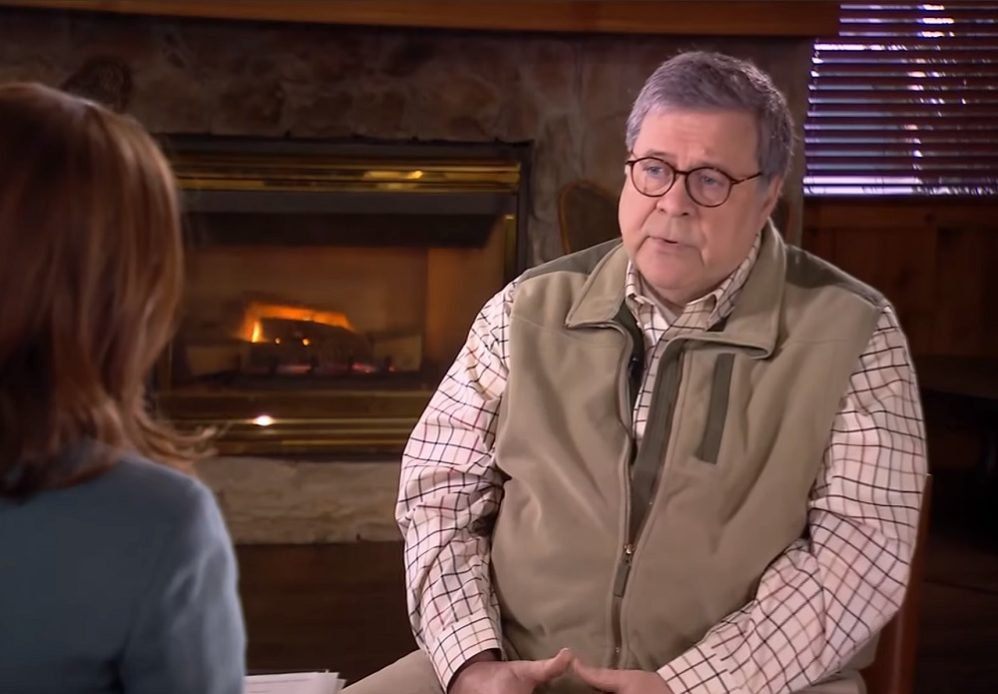'The idea of resisting a democratically elected president and...really changing the norms on the grounds that we have to stop this president, that is where the shredding of our norms and our institutions is occurring.'
Attorney General William Barr’s nearly hour-long interview with CBS News’ Jan Crawford last week was full of fascinating details about the special counsel probe, the debunked Russia collusion theory that roiled Washington for years, and Barr’s investigation into how the FBI and Department of Justice used the “bogus” theory to investigate the Trump campaign.
The interview was downplayed by the media, which is implicated in perpetuating the Russia hoax Barr is investigating, and which came in for criticism from Barr for its failure to care about violations of civil liberties. Here are the top 28 take-aways from the interview.
1. Mueller ‘Could Have Reached a Conclusion’
Crawford, whose questions revealed a command of the facts not demonstrated by many of her mainstream media peers, asked Barr about Special Counsel Robert Mueller’s decision to outline 11 instances where President Trump’s frustration at falsely being accused of treason could amount to “possible obstruction” followed by a refusal to decide whether they did.
Barr explained that the Office of Legal Counsel opinion that prevents presidents from being indicted was no barrier to making a conclusion about obstruction. “Right, he could have reached a conclusion,” Barr said, noting that he and Deputy Attorney General Rod Rosenstein concluded that Trump had not obstructed justice.
“[W]hen he didn’t make a decision, the Deputy Attorney General Rod Rosenstein and I felt it was necessary for us as the heads of the Department to reach that decision,” Barr said. “That is what the Department of Justice does, that is why we have the compulsory powers like a grand jury to force people to give us evidence so that we can determine whether a crime has committed and in order to legitimate the process we felt we had to reach a decision.”
2. DOJ Not an ‘Adjunct to Congress’
Mueller received praise from the media for, they said, subtly asking Congress to impeach the president for, apparently, his frustration with falsely being accused of being a traitor. Barr was less enamored of this idea.
“Well, I am not sure what he was suggesting but, you know, the Department of Justice doesn’t use our powers of investigating crimes as an adjunct to Congress. Congress is a separate branch of government and they can, you know, they have processes, we have our processes. Ours are related to the criminal justice process. We are not an extension of Congress’s investigative powers,” he said.
3. Mueller’s Guilty Until Proven Innocent Standard ‘Not The Standard We Use’ At DOJ
Mueller’s refusal to determine whether President Trump had obstructed justice by making hiring and firing decisions or complaining about false accusations he had conspired with Russia to steal the 2016 election was one problem. The other was that Mueller flipped the standard prosecutorial approach on its head, Barr said.
“[H]e also said that he could not say that the president clearly did not violate the law, which of course is not the standard we use at the department. We have to determine whether there is clear violation of the law, and so we applied the standards we would normally apply. We analyzed the law and the facts and a group of us spent a lot of time doing that and determined that both as a matter of law, many of the instances would not amount to obstruction,” Barr said.
4. --->Read the rest of the 28 Moments From Bombshell Barr Interview HERE at The Federalist
If you like what you see, please "Like" us on Facebook either here or here. Please follow us on Twitter here.



No comments:
Post a Comment